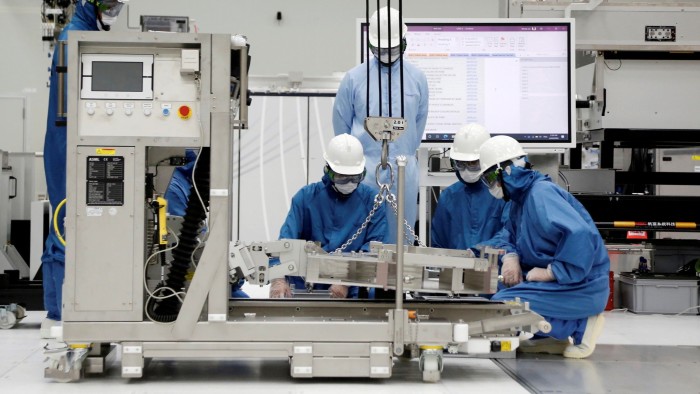Unlock the Editor’s Digest for free
Roula Khalaf, Editor of the FT, selects her favourite stories in this weekly newsletter.
Holding a virtual monopoly in a product on which the artificial intelligence boom relies should be a golden ticket. For chipmaker Nvidia, it has been. But ASML, which makes extraordinarily complex machines that etch silicon and is no less integral to the rise of AI, has found that ruling the roost can still be an up-and-down affair.
The €270bn Dutch manufacturer, which reports its earnings next week, is a sine qua non of technology; chips powering AI and even fridges are invariably etched by ASML’s kit. The flipside is its exposure to customers’ fortunes and politics.
Revenue is inherently lumpy, and a single paused purchase makes a big dent — a key difference from fellow AI monopolist Nvidia, which is at present struggling to meet demand for its top-end chips. ASML’s newest high numerical aperture (NA) systems go for €380mn; as an example of how volatile revenue can be for such big-ticket items, one delayed order would be akin to drivers holding off on buying 8,000-odd Teslas.
Initial hopes were high for robust spending on wafer fab equipment this year and next. Semi, an industry body, in December reckoned on an increase of 7 per cent this year and twice that in 2026. Jefferies, for example, now expects sales to flatline next year.
Mood music bears that out. Top chipmaker TSMC has sounded more cautious over the timing of the adoption of new high NA machines. Other big customers are reining in spending. Intel in April shaved its capital expenditure plans by $2bn to $18bn, while consensus numbers for Samsung Electronics suggest the South Korean chipmaker will underspend last year’s $39bn capex budget.
Politics is also getting thornier. Washington, seeking to hobble China’s tech prowess, has banned sales of ASML’s more advanced machines. Going further would hurt. China, which buys the less advanced but more profitable deep ultraviolet machines, typically accounts for about a quarter of sales. Last year, catch-up on orders lifted that to half.
Meanwhile, Chinese homegrown competition, given an extra nudge by US trade barriers, is evolving. Shenzhen government-backed SiCarrier, for example, claims to have encroached on ASML territory with lithography capable of producing less advanced chips.
The good news is that catch-up in this industry, with a 5,000-strong supplier base and armies of engineers, requires years if not decades. Customers, too, will probably be deferring rather than nixing purchases. The zippier machines help customers juice yields; Intel reckons it cuts processes on a given layer from 40 steps to just 10.
Over time, ASML’s enviable market position looks solid — and perhaps more so than that of Nvidia, whose customers are increasingly trying to create their own chips. Yet the kit-maker’s shares have been the rockier investment. In the past year, ASML has shrunk by a third while Nvidia has risen by a quarter; its market capitalisation is within a whisker of $4tn. That makes ASML the braver bet, but by no means a worse one.




